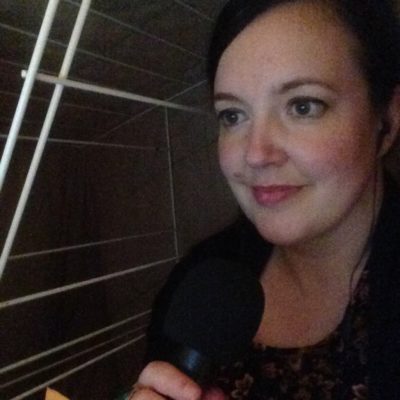| 00:00
|
Music: |
[Piano Overlaid With Distorted Beat] |
| 00:10 |
Hannah McGregor: |
Welcome to the SpokenWeb ShortCuts. Each month on alternate fortnights (that’s every second week following the monthly SpokenWeb Podcast episode) join me, Hannah McGregor and our minisode host and curator, Katherine McLeod for SpokenWeb’s ShortCuts mini-series. |
| 00:28 |
Hannah McGregor: |
We’ll share with you specially curated audio clips from deep in the SpokenWeb archives to ask: what does it mean to cut and splice digitally? What kinds of new stories and audio criticism can be produced through these short archival clips? An extension of the ShortCuts blog posts [Sound Effect: Wind Chime] on SPOKENWEBLOG, this series brings Katherine’s favourite audio clips each month to the SpokenWeb Podcast feed. So, if you love what you hear, make sure to head over to spokenweb.ca for more. Without further ado, here is Katherine McLeod with SpokenWeb ShortCuts, mini stories about how literature sounds. |
| 01:12 |
SpokenWeb Podcast Theme Music: |
[Instrumental Overlapped With Feminine Vocals]
|
| 01:18 |
Katherine McLeod: |
How can you hear time? When listening to a recording? Can you be listening for time? In a set of recordings of a reading series, such as the Sir George Williams Poetry Series, there’s an audible marking of time whenever a host of a December reading mentions that the next reading will take place in January. The new year. What hopes did the audience have for the new year? How do these archival recordings help us understand hope in our present moment?
|
| 01:53 |
Audio Recording, Daryl Hine, Sir George Williams Poetry Series, Montreal, 1 December 1967: |
I negotiate the steps of paradise leaping to measures that I cannot hear. Thank you. [Applause]. [Announcer] I want to thank Mr. Hine and also announce that the next reading is on January 26 by the American poet, John Logan.
|
| 02:33 |
Katherine McLeod: |
That was a clip of the end of Daryl Hine, reading “The Trout” in December, 1967. What was the audience thinking? And what did they imagine for January, 1968? What did Hine imagine? What if these were the last words of poetry that he read out loud in front of an audience in 1967? The words suddenly feel weightier when thinking of them in that way, a feeling that I would argue we can hear in another reading that ends up being the last one of 1968 in the Sir George Williams Series. It’s a reading by James Wright on December 13th, 1968.
|
| 03:14 |
Audio Recording, James Wright, Sir George Williams Poetry Series, Montreal, 13 December 1968: |
Suddenly I realize that if I stepped out of my body, I would break into blossom. Thank you. [Applause] [Announcer]I just like to express all our thanks to James Wright for sharing his poetry and his curses and blessings with us tonight and to remind you that the next reading in the series is by Muriel Rukeyser on Friday, January 24th. Goodnight. |
| 03:57 |
Katherine McLeod: |
What did the audience hear when they heard —
|
| 04:01 |
Audio Recording, James Wright, Sir George Williams Poetry Series, Montreal, 13 December 1968:
|
Suddenly I realized that if I stepped out of my body, I would break into blossom. |
| 04:08 |
Katherine McLeod: |
—? What hopes did they have for 1969 as they listened? 1969. The last reading of that year in the Sir George William Series was introduced by George Bowering and the anticipation of the new year comes up right at the start.
|
| 04:23 |
Audio Recording, George Bowering (introducing Gladys Hindmarch): |
Another Vancouver night in the series. This will be, this is a final reading of the fall series and will be picked up again in January. And as you know, from the propaganda sheets, or presenting what I consider to be the center of the Vancouver writing scene. Gladys Hindmarch has been in that scene for 10 years and was associated with all those, with those people who’ve got all kinds of names over the last few years such as the West Coast movement and the Tish movement and the New Wave Canada and that sort of business…
|
| 05:08 |
Katherine McLeod: |
By the way, Bowering and Hindmarch read together virtually on December 16th, 2020. I mentioned that to mark time here in this minisode. Back to the archive:1970. Let’s see how this year ends in poetry, or at least in the Sir George Williams Poetry Series. The reading by Ted Berrigan on December 4th, 1970 is cut off so we don’t know if it ended with an announcement about the next reading. But it did end with Berrigan reading this poem. These are the last words heard in this last reading of 1970. It is the end of a poem called “People Who Died.”
|
| 05:50 |
Audio Recording, Ted Berrigan, Sir George Williams Poetry Series, Montreal, 4 December 1970: |
Killed by smoke poisoning while playing the flute at the Yonkers Children’s Hospital during a fire set by a 16 old arsonist/ 1965. Frank. Frank O’Hara hit by a car on Fire Island/1966, Woody Guthrie, dead of Huntington’s Chorea/ In 1968. Neil. Neil Cassidy died of exposure sleeping all night in the rain by the railroad tracks of Mexico/ 1969.Franny Winston, just a girl totaled her car on the Detroit Ann Arbor freeway returning from the dentist / September, 1969. Jack. Jack Kerouac died of drink and angry sicknesses in 1969/ My friends whose deaths have slowed my heart stay with me now. [Applause].
|
| 06:55 |
Katherine McLeod: |
We are listening to what it felt like to hear those words in 1970, and to feel those deaths as recent. We are hearing time and what it felt like to feel in that time. In the Berrigan poem, that feeling is one of loss, a feeling that so often counters a feeling of anticipation. We hear that anticipation in my last example, the end of a reading by Charles Simic in 1971.
|
| 07:26 |
Audio Recording, Charles Simic, Sir George Williams Poetry Series, Montreal, 19 November 1971: |
The greatest mistake. The words I allow it to be written when I should have shouted her name. Thank you. [Applause]. [Announcer] The next reading will be on January 14th – Dorothy Livesay will read at that time.
|
| 07:52 |
Katherine McLeod: |
If I were in the audience in 1971, I would be looking forward to that reading by Dorothy Livesay in 1972. Listening for time in the archives reveals moments such as these. Ones in which hope is audible. That listening is something we can learn from as we anticipate a new year. We don’t know what is ahead. And, even as I speak these words now – recording them under my blanket fort at home – I hope they will be heard. [Music Begins: Piano Overlaid With Distorted Beat] Though, in what context I do not know right now, I play the role of the host in these archival recordings by marking time here and now, and by imagining a future time. In the role of the archival listener, I also know how it feels to hear a future time imagined as hopeful. It’s a powerful feeling to look forward to something, to share that feeling, and to listen back, hearing people looking forward to something. Thanks for listening and here’s to more listening together in 2021. |

